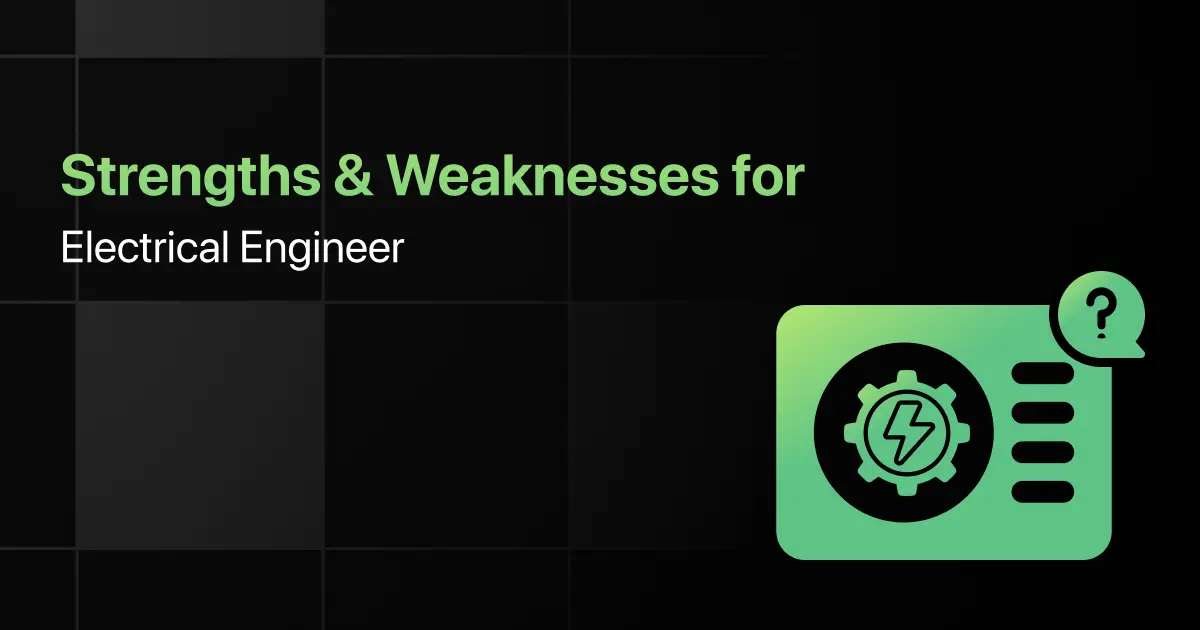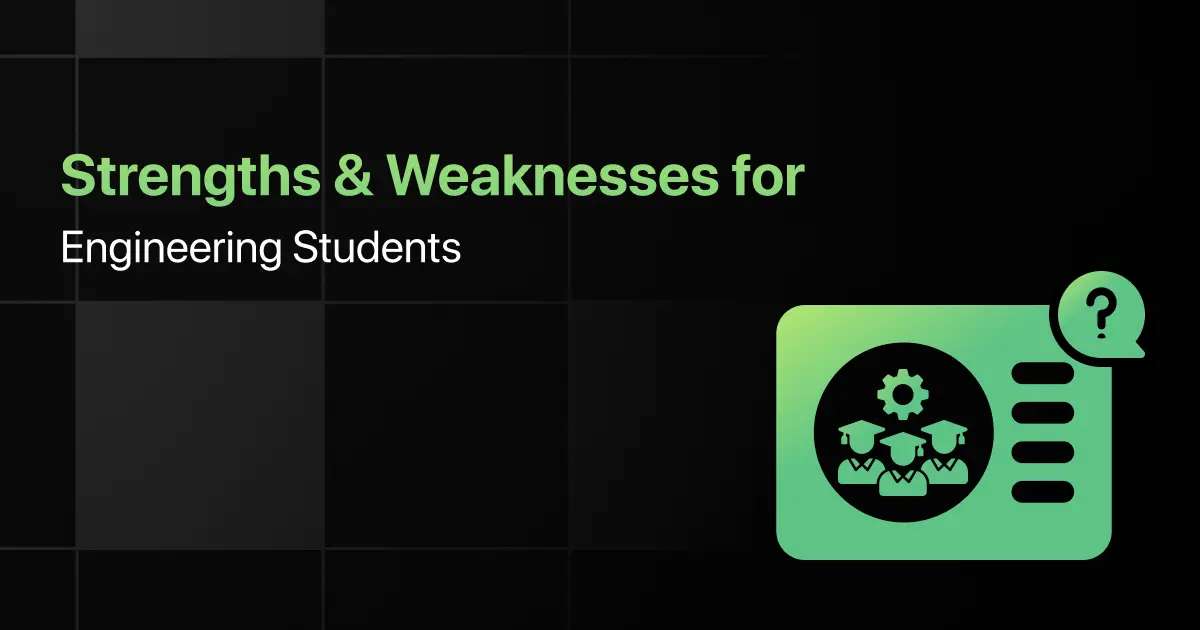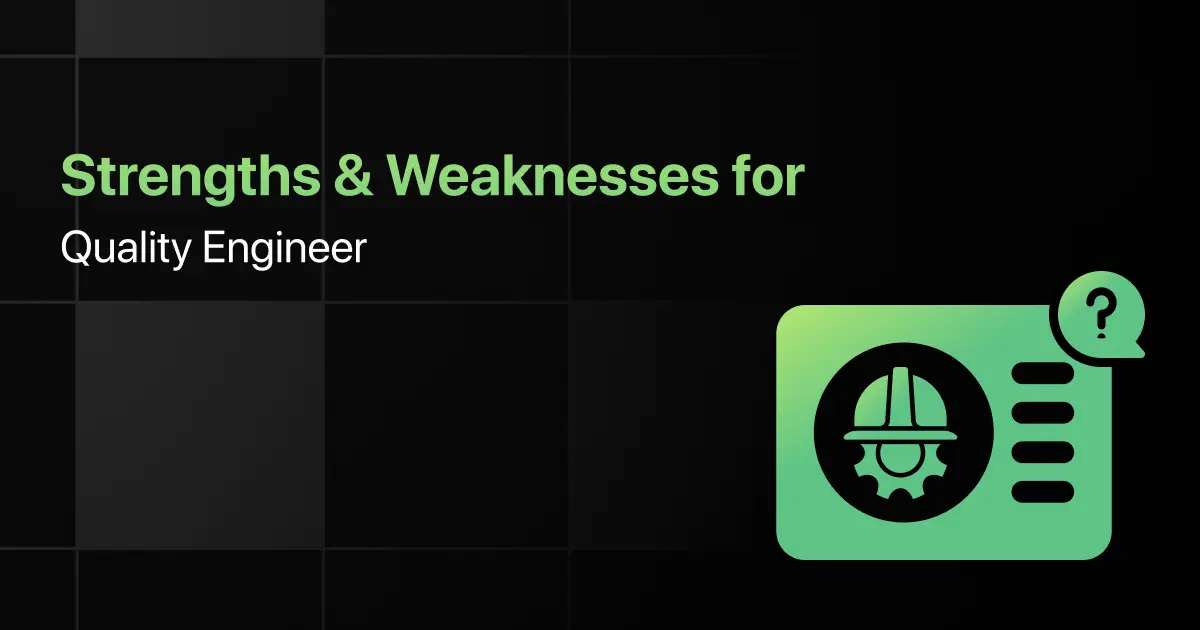Strengths & Weaknesses for Electrical Engineer Freshers

For electrical engineers, job interviews are a chance to showcase both their technical expertise and problem-solving skills.
However, many struggle to explain their strengths and weaknesses in a way that makes a good impression.
This blog will help with strengths & weaknesses for electrical engineers.
Strengths for Electrical Engineer Interviews
Below are the 3 strengths for electrical engineers for interviews:
1. Expertise in Circuit Design & Power Systems
Circuit design and power systems are fundamental to electrical engineering, ensuring efficient energy distribution and reliable electronic systems.
A strong grasp of designing circuits, analyzing power flow, and selecting components helps engineers create safe, cost-effective, and high-performance electrical systems.
Experience with tools like MATLAB, PSPICE, or AutoCAD Electrical is essential for modern circuit design.
Template Version:
“At [Your Previous Company], I designed and optimized circuits for [specific project, e.g., ‘a renewable energy system’].
By using [specific tool, e.g., ‘PSPICE’], I improved efficiency by [specific result, e.g., ‘15%’], reducing power losses.”
Logic Behind This:
This version links circuit design to a real-world application and a measurable improvement.
Mistakes to Avoid:
Don’t just say “I design circuits”—explain what kind and for what purpose.
Avoid listing tools without explaining how they helped in your design process.
Don’t forget to mention how your circuit design improved efficiency.
2. Strong Troubleshooting & Fault Diagnosis Skills
Electrical engineers often deal with system failures, requiring strong troubleshooting and fault diagnosis skills.
Identifying issues quickly and applying systematic problem-solving techniques like signal tracing or thermal imaging helps ensure minimal downtime and prevents costly failures.
Template Version:
“At [Your Previous Company], I diagnosed and resolved a critical fault in [specific system, e.g., ‘an industrial power distribution network’].
By using [specific technique, e.g., ‘thermal imaging and circuit analysis’], I identified a faulty transformer, preventing a [specific issue, e.g., ‘major power outage and saving repair costs of $50,000’].”
Logic Behind This:
This version connects troubleshooting skills, showing their impact on preventing failures and saving costs.
Mistakes to Avoid:
Don’t just say “I’m good at troubleshooting”—explain how you solve electrical issues.
Avoid mentioning tools without stating how they helped in fault detection.
Don’t forget to highlight how your quick diagnosis prevented bigger problems.
3. Proficiency in Embedded Systems & Control Systems
Embedded systems and control systems are crucial for automation, robotics, and IoT applications.
A deep understanding of microcontrollers, PLCs, and real-time operating systems (RTOS) allows engineers to develop efficient and smart electrical solutions.
Template Version:
“At [Your Previous Company], I developed an embedded control system for [specific application, e.g., ‘an automated manufacturing line’], using [specific tool, e.g., ‘Arduino and PLCs’].
By optimizing the firmware and control logic, we improved system response time by [specific result, e.g., ‘30%’], enhancing overall efficiency.”
Logic Behind This:
This version highlights how embedded systems improve real-world automation.
Mistakes to Avoid:
Don’t just say “I know embedded systems”—explain how you’ve applied them.
Avoid general statements like “I use microcontrollers” without a specific project example.
Don’t forget to mention the real impact of your control system improvements.
Weaknesses for Electrical Engineer Interviews
Below are the 3 weaknesses for electrical engineers for interviews:
1. Limited Experience with AI & IoT Integration
AI and IoT are changing the electrical engineering field, making systems smarter and more efficient.
If an engineer has limited experience in these areas, they might struggle with designing modern, connected systems.
Template Version:
“In my previous roles, I mainly focused on traditional electrical systems and had limited exposure to AI and IoT applications like [specific technology, e.g., ‘smart grids’ or ‘machine learning-based diagnostics’].
To improve, I have started taking courses and working on small projects to build my knowledge in this area.”
Logic Behind This:
This response is good because it shows awareness of the gap and a clear effort to improve.
Mistakes to Avoid:
Don’t say AI and IoT aren’t important—they are becoming essential in modern engineering.
Avoid sounding like you are completely unfamiliar—mention your learning efforts.
Don’t make it seem like you’re resistant to new technologies—show enthusiasm for growth.
2. Struggles with Regulatory Compliance
Electrical engineers must follow strict safety and industry regulations. Struggling with compliance can lead to delays or issues in project approvals, so it’s important to stay updated and manage documentation properly.
Template Version:
“I’ve noticed that keeping up with detailed regulations like [specific standard, e.g., ‘IEC or NEC codes’] can be challenging because they are constantly updated.
To improve, I have started attending compliance training sessions and using regulatory tracking tools to stay informed.”
Logic Behind This:
This answer works well because it shows that you understand the importance of compliance and are actively working to improve your knowledge.
Mistakes to Avoid:
Don’t suggest that regulations are unnecessary—compliance is critical in electrical engineering.
Avoid making it sound like you ignore compliance—always show that you take it seriously.
Don’t just list the problem—explain the steps you’re taking to improve.
3. Over-Reliance on Simulation Over Real-World Testing
Simulations help in designing and testing electrical systems, but real-world testing is necessary to catch unexpected issues. Engineers who rely too much on simulation might struggle when actual conditions don’t match the model.
Template Version:
“I often use simulation tools like [specific tool, e.g., ‘MATLAB or PSpice’] to test designs, but I’ve realized that real-world testing is just as important. T
To improve, I’ve been working on gaining more hands-on experience by setting up small test environments.”
Logic Behind This:
This is a strong response because it acknowledges the importance of both simulation and hands-on testing.
Mistakes to Avoid:
Don’t say simulation is enough—real-world testing is critical in electrical engineering.
Avoid making it sound like you lack hands-on skills—show that you are improving.
Don’t ignore the risks of relying too much on theoretical models—balance is key.
Final Words
In the end, knowing how to talk about your strengths and weaknesses can make a big difference in an electrical engineering job interview.
By being honest about your skills and showing a desire to improve, you demonstrate that you’re ready.
Frequently Asked Questions
1. What key strengths should an electrical engineer mention during an interview?
Electrical engineers should highlight their strong understanding of circuit design, proficiency in simulation tools, and experience with both hardware and software integration.
2. What are the most common weaknesses of electrical engineers?
Common weaknesses include difficulty in managing time effectively, sometimes struggling with communication in cross-functional teams, limited experience in certain specialized areas, and challenges in dealing with complex, large-scale projects.
3. How can electrical engineering freshers identify their strengths and weaknesses?
Freshers can identify their strengths and weaknesses by reflecting on past academic projects, internships, or lab work.
They can also seek feedback from mentors or professors and evaluate their performance level.
4. How can electrical engineers frame their weaknesses in a positive way during interviews?
Electrical engineers can frame their weaknesses in a positive way by focusing on those they are actively improving and demonstrating their willingness to learn, adapt, and grow.
5. What technical skills should electrical engineers emphasize in job interviews?
Electrical engineers should emphasize their skills in circuit design, power systems, control systems, electrical simulation software (like MATLAB, SPICE), and programming languages such as C or Python. Knowledge of renewable energy systems, automation, and PCB design is also valuable.
Related Posts

Strengths & Weaknesses for Engineering Students Freshers
For engineering students, job interviews can feel challenging because they are just starting their careers. One of the toughest parts is …






